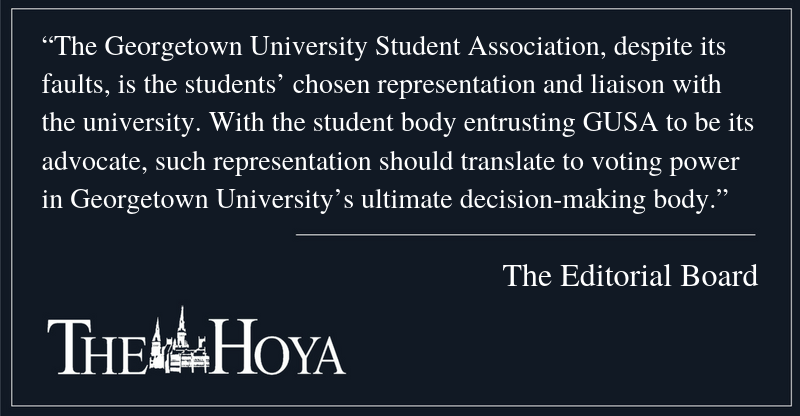Despite its efforts to serve as an advocate for students, the Georgetown University Student Association often falls short of accomplishing its goals. GUSA’s inefficacy is not entirely its fault: Structurally, the body often cannot act on major campus issues without university support.
Though GUSA can communicate student perspectives to the university’s board of directors at the board’s meetings, no student has voting power. To amplify student voices and make GUSA more effective, Georgetown should give a voting seat to the GUSA president on the board’s Committee on Main Campus Affairs.
The board has two undergraduate student representatives, chosen by the GUSA president and vice president and the previous year’s two representatives. The representatives do not have voting power.
The inclusion of student voices on the board, while a good start, is insufficient. Unlike the undemocratic and nontransparent process of choosing the student representatives, having the GUSA president serve as a member of the board would allow students to choose their representative at the decision-making table.
GUSA election voter turnout has historically been low — this semester’s senate elections saw a turnout rate of 19.2%, down from last fall’s 21%. But students have shown they are willing to engage when they see that GUSA actions can potentially lead to significant change on campus.
Last spring, the historic GU272 referendum to establish a fund benefiting the descendants of enslaved people sold by the Maryland Province of the Society of Jesus in 1838 to financially sustain the university led to an electoral turnout of 57.9%, the highest in GUSA history.
Students clearly want to participate in decisions that affect their time on campus. But Georgetown’s failure to include a GUSA representative on its board shows how the university does not adequately value student representation in its decision-making processes.
GUSA representatives are invited to share their perspectives on campus issues with the committee during the board of directors’ meetings, university spokesperson Rachel Pugh wrote in an email to The Hoya. The board’s Working Group on Student Affairs also allows GUSA to regularly communicate with board members, according to Pugh.
Though it is undoubtedly important for GUSA representatives to speak with the board, such communication is only a first step: GUSA’s power to influence the board is limited without voting power. By giving GUSA membership and voting power on the campus affairs committee, students can more directly influence university decisions through the GUSA president.
GUSA, despite its faults, is the students’ chosen representation and liaison with the university. With the student body entrusting GUSA to be its advocate, such representation should translate to voting power in the university’s ultimate decision-making body.
If Georgetown truly values student representation in its decision making, it should live up to its commitment by allocating more power to GUSA and giving it a voting seat on the board. In turn, students will see the importance of GUSA and participate in elections and conversations about important campus issues.
To demonstrate that students are capable of using their seat at the table responsibly and effectively, members of GUSA and the entire student population must take their responsibilities in advocating for student interests more seriously .
Students can’t be expected to take GUSA seriously if GUSA senators don’t even show up in the most basic form — GUSA senators must correct course from the quadrupling of absences last academic year. Executive policy teams should be expected to develop detailed, realistic plans and carry them out. For the university to listen to their advocacy, GUSA members must fulfill their duties first.
If the university were to grant a GUSA representative a seat at the table, students should also be serious in their consideration in voting for GUSA senators and executives. Students should be wary of satirical candidates, such as the 2018 Batman and Robin ticket of Logan Arkema (COL ’20) and Jonathan Compo (COL ’20) and the Hot Chick and Chicken Madness ticket, which came in second place in 2016.
Though the satire of such candidates can be entertaining, such campaigns show students are not taking GUSA seriously, which is ultimately detrimental for GUSA’s authority and efficacy on campus.
Current student representation on the board is a step in the right direction, but it is insufficient. To show it values student voices, Georgetown must include elected student representation in a meaningful way in decision-making.
The Hoya’s editorial board is composed of six students and chaired by the opinion editor. Editorials reflect only the beliefs of a majority of the board and are not representative of The Hoya or any individual member of the board.















Talmid 21 • Oct 8, 2019 at 1:14 pm
GUSA Senators should realistically sign a pledge that they will not take an internship, a top level position in a club, study abroad, or take 6 classes if they truly want to represent the people. You can’t advocate for the student body when you concentrate your non academic efforts elsewhere
aleida • Oct 6, 2019 at 8:53 pm
gang gang